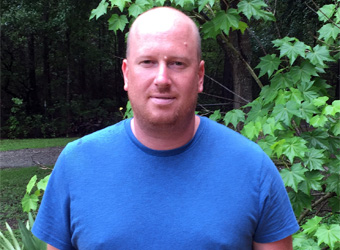Throughout the course of his 21-year career in the U.S. Army, Jeremiah Espersen got accustomed to being told precisely where to go, what to eat, and even when to go to the bathroom.
So after filing his retirement paperwork earlier this year, Espersen found himself searching for some direction.
“When it came down to planning what I was going to do next, I had to look myself in the mirror and say, ‘What do I like to do?’” Espersen said. “And the honest answer was, ‘I didn’t know.’”
This fall, the 39-year-old Espersen is continuing his education after graduating from high school more than 20 years ago to pursue a bachelor’s degree in secondary education at Trinity Baptist College (TBC) in Jacksonville. His plan is to ultimately teach high school math and English. Espersen arrived at that career path after examining the most fulfilling parts of an Army career that began right after high school.
Born in Omo Ranch, California — a town with a population of “a little over 100 people” at the time, according to Espersen — he joined the Army in 1996 after graduating from El Dorado High School in Placerville, California.
“I was from a small town and wanted some adventure…I wanted to see the world,” said Espersen, who also had his family in mind when he decided to join the military. “My grandfather was a Pearl Harbor survivor, and he was an inspiration for me as far as serving our country. My parents were also going to help pay for college, but I told them I didn’t want them wasting their money since I’d rather do something more along the lines of the Armed Forces.”
Espersen attained the rank of Sergeant First Class (SFC), and his Army career included stints in Fort Jackson in South Carolina (where he did basic training) and, most recently, Fort Bragg in North Carolina (where he was a member of the 82nd Airborne Division). But it was his time in Arizona’s Fort Huachuca that sparked his current career aspirations.
That’s where Espersen — who was deployed to Afghanistan twice — was asked to serve as an instructor for a new course designed for Afghan intelligence officers.
“The Afghan Army, in its entire history, had never had an intelligence corps; word of mouth is mostly how they would get information on enemy positions and anything intel-wise,” Espersen said. Fort Huachuca is home to the U.S. Army Intelligence Center of Excellence, which trains the Army’s military intelligence personnel. “The (U.S.) Army wanted to start an intelligence school (for Afghan intelligence officers), they needed instructors, and I was the guy developing it.”
When Espersen was contemplating a professional path to pursue in his post-Army life, he thought back to his teaching days at Fort Huachuca.
“Out of my entire career, the most enjoyable thing I encountered was my interaction with young soldiers and my interaction with those Afghan students,” Espersen said. “All of those interactions were in a mentorship, guidance, or teaching role. So I thought, ‘What about teaching?’”
Once he decided on a career path, Espersen and his family — wife of 16 years Laura, and the couple’s three children, ages 7, 5, and 16 months — needed to settle on a new home base. They considered a variety of factors.
“Out of the entire U.S., we looked at where we had family and what states offered good schools,” Espersen said. The family is renting a house in Yulee, Florida, which is part of the Jacksonville metropolitan area where Trinity Baptist College is located. His parents live in nearby Fernandina Beach. “We considered going back to California, but the cost of living there was astronomical.”
With Northeast Florida set as the family destination, Espersen now needed to consider which college to pursue in the area. He decided to attend Trinity Baptist College after narrowing his options to three and encountering some unexpected road blocks at the other two schools, one public and the other private. One school that didn’t offer the education program he was looking for, while the other would have required him to tailor his class schedule a certain way in order to receive a full housing stipend.
“TBC is small, it felt like a family, and every staffer was like, ‘How can we support you?’ every step of the way,” Espersen said.
Espersen has signed up for 18 credit hours at TBC this fall and said he avoided taking out any loans out of a desire to be more fiscally responsible and debt free. While almost his entire tuition will be covered by the G.I. Bill, Espersen also qualified for a full Pell Grant, which will help cover housing costs during December and the summer months when he’s not in school
“It’s common sense when you think about, but that’s something I wish they would’ve briefed us on,” Espersen said. “The VA will not pay you the housing stipend during any portion of the (school) break.”
Heading into the fall semester at TBC, Espersen was excited about the opportunity to learn from a new crop of teachers and potentially mentor some of his peers. He also felt some nervousness, which he alleviated by keeping things in perspective.
“It’s funny what you become apprehensive about,” Espersen said. “If I can go through multiple combat tours and jump out of airplanes, I have to laugh at my own self for being nervous about going back to school.”
This story is part of Florida College Access Network’s “Pathway Series”, a year-long project that seeks to highlight the diversity of experiences students face as they pursue postsecondary degrees. Each student will be profiled at the start of the school year, during the fall, in the spring, and during the summer following the conclusion of their first year.


